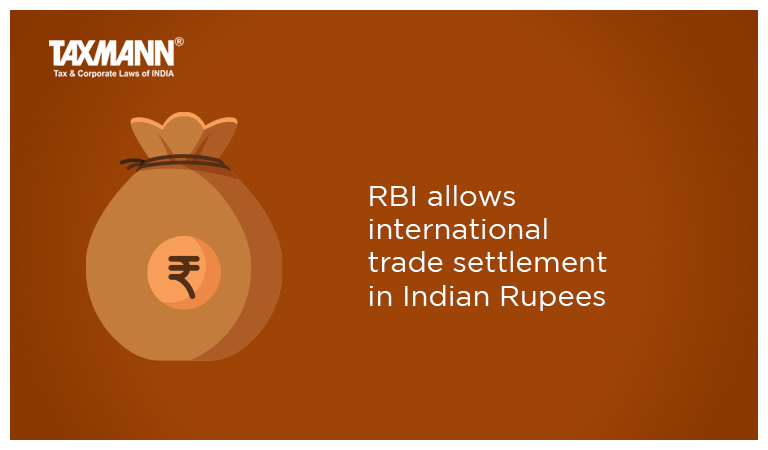RBI allows international trade settlement in Indian Rupees
- Blog|News|FEMA & Banking|
- 2 Min Read
- By Taxmann
- |
- Last Updated on 13 July, 2022

RBI/2022-2023/90 A.P. (DIR SERIES) CIRCULAR NO. 10, Dated July 11, 2022
In order to promote the growth of global trade with emphasis on exports from India and to support the increasing interest of the global trading community in INR, it has been decided to put in place an additional arrangement for invoicing, payment, and settlement of exports/imports in INR. Before putting in place this mechanism, AD banks shall require prior approval from the Foreign Exchange Department of Reserve Bank of India, Central Office at Mumbai.
RBI said that for settlement of trade transactions with any country, AD bank in India may open Special Rupee Vostro Accounts of correspondent bank/s of the partner trading country.
In order to allow settlement of international trade transactions through this arrangement, the RBI has decided that:
(a) Indian importers undertaking imports through this mechanism shall make payment in INR which shall be credited into the Special Vostro account of the correspondent bank of the partner country, against the invoices for the supply of goods or services from the overseas seller /supplier.
(b) Indian exporters, undertaking exports of goods and services through this mechanism, shall be paid the export proceeds in INR from the balances in the designated Special Vostro account of the correspondent bank of the partner country.
“The export/import undertaken and settled in this manner shall be subject to usual documentation and reporting requirements. Letter of Credit (LC) and other trade related documentation may be decided mutually between banks of the partner trading countries under the overall framework of Uniform Customs and Practice for Documentary Credits (UCPDC) and incoterms. Exchange of messages in safe, secure, and efficient way may be agreed mutually between the banks of partner countries” said RBI
With regard to the advance against export, the RBI clarified that Indian exporters may receive advance payment against exports from overseas importers in Indian rupees through the above Rupee Payment Mechanism. RBI advised that before allowing any such receipt of advance payment against exports, Indian Banks shall ensure that available funds in these accounts are first used towards payment obligations arising out of already executed export orders/export payments in the pipeline
Click Here To Read The Full Circular
Disclaimer: The content/information published on the website is only for general information of the user and shall not be construed as legal advice. While the Taxmann has exercised reasonable efforts to ensure the veracity of information/content published, Taxmann shall be under no liability in any manner whatsoever for incorrect information, if any.

Taxmann Publications has a dedicated in-house Research & Editorial Team. This team consists of a team of Chartered Accountants, Company Secretaries, and Lawyers. This team works under the guidance and supervision of editor-in-chief Mr Rakesh Bhargava.
The Research and Editorial Team is responsible for developing reliable and accurate content for the readers. The team follows the six-sigma approach to achieve the benchmark of zero error in its publications and research platforms. The team ensures that the following publication guidelines are thoroughly followed while developing the content:
- The statutory material is obtained only from the authorized and reliable sources
- All the latest developments in the judicial and legislative fields are covered
- Prepare the analytical write-ups on current, controversial, and important issues to help the readers to understand the concept and its implications
- Every content published by Taxmann is complete, accurate and lucid
- All evidence-based statements are supported with proper reference to Section, Circular No., Notification No. or citations
- The golden rules of grammar, style and consistency are thoroughly followed
- Font and size that’s easy to read and remain consistent across all imprint and digital publications are applied



 CA | CS | CMA
CA | CS | CMA
